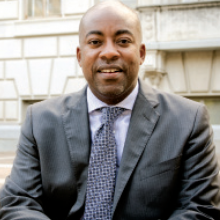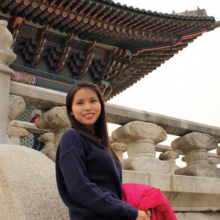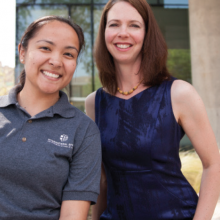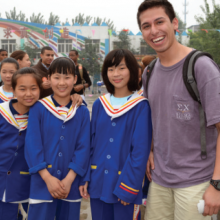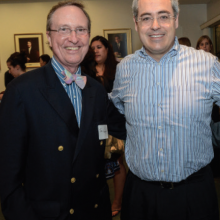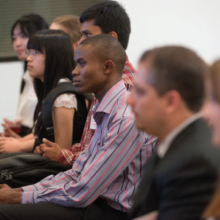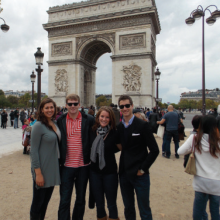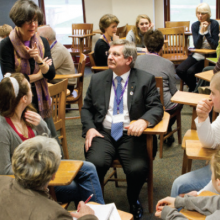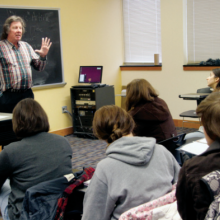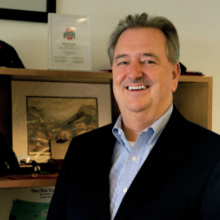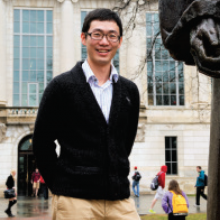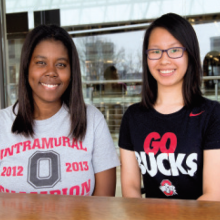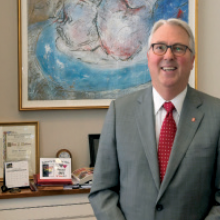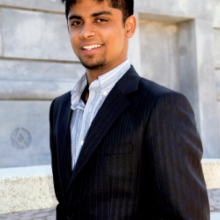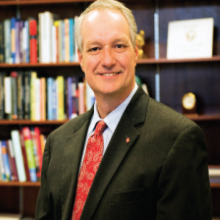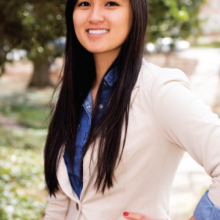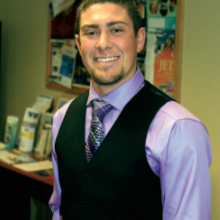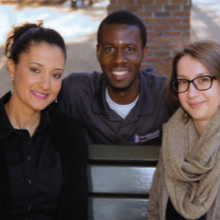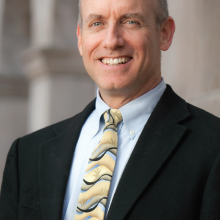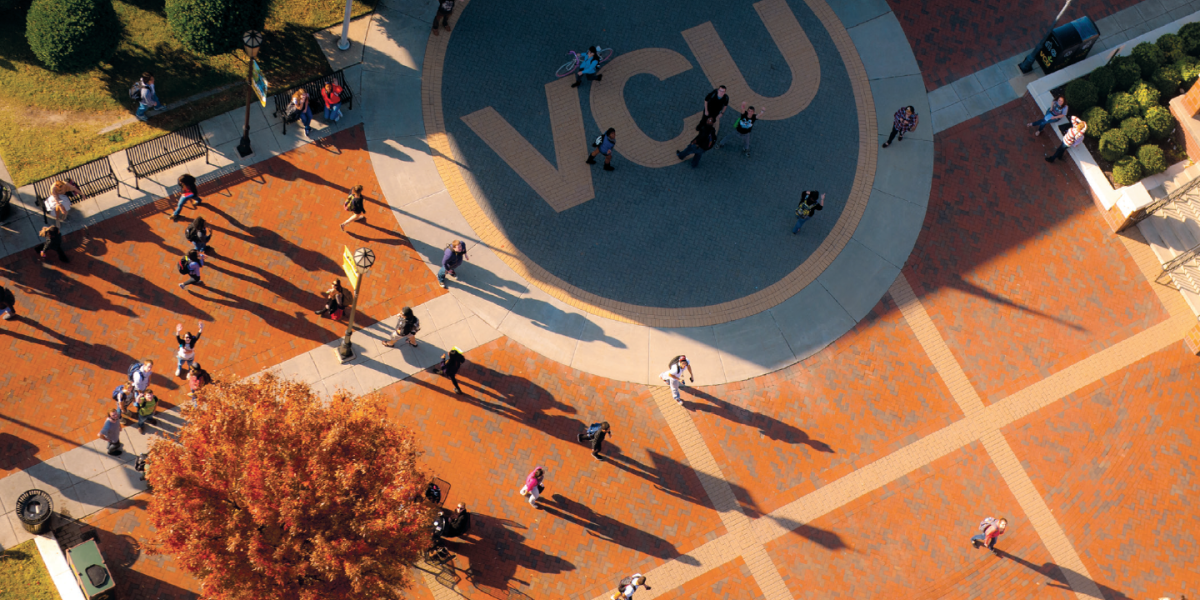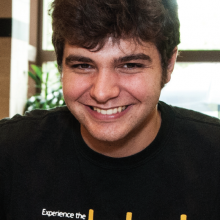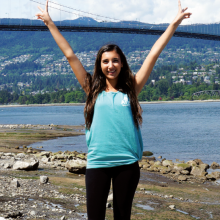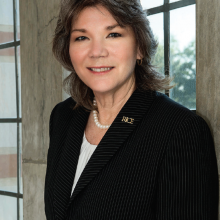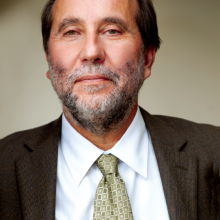2013 Comprehensive Colorado State
Soon after veterinary pathologist Tony Frank became vice president for research at Colorado State University in 2000, he was asked by the then-president to accompany him to South Korea. “I wasn’t horribly enthused,” recalled Frank. “I’d been very focused on my own lab and had almost no connections to international activity. I really didn’t see what value I was going to add or how it was going to have a big impact.” But Frank returned from Seoul “an absolute convert,” won over to the idea that forging strategic partnerships with universities overseas could expand Colorado State’s reach and pay large dividends for its scholars, researchers, and students. “To be honest, I spent a lot of time kicking myself after that for having missed as many opportunities as I had over the years,” said Frank, who went on to become provost and, in 2008, president. He now has logged 12 international trips.
The land-grant institution, established in 1870 when Colorado was still a territory, is working hard not to miss opportunities these days. It has close partnerships with 17 universities in 11 countries including a new Joint Research Institute with East China Normal University (ECNU) in Shanghai and a robust dual-degree program with the Foreign Trade University in Hanoi, Vietnam. It has stepped up recruitment of international students to the picturesque Fort Collins campus in the foothills of the Rockies. In 2008–2009 there were fewer than 900 international students. Today there are more than 1,650, including a recent influx of more than 400 in its new intensive English and academic preparatory program called INTO Colorado State University.
CSU is following a script laid out in a 2007 internationalization strategy. Leaders speak of “building the brand” and improving lives “throughout Colorado and the world.” Tom Milligan, vice president for external relations, who spearheads the branding push, said, “Being a global institution is part of how we want to think and talk about ourselves and position ourselves. We’re different from other medium-to-large-size public institutions. The things that we’re good at, like water, biomedicine, and veterinary medicine, we’re as good as anybody in the world.”
Links Around the World
Vice Provost for International Affairs James Cooney said, “The heart of our internationalization strategy from the beginning has been to link specifically to institutions around the world, get our faculty involved with those institutions, and develop joint research.” The hiring of Cooney in 2007 to a new position with elevated stature was also part of that strategy. The political scientist was lured to Fort Collins from Harvard University’s Weatherhead Center for International Affairs.
One aspect of Colorado State’s story is familiar to public universities almost everywhere: steep state budget cuts, amounting to $36 million or 28 percent over three years before a $6 million bump up this year. Only federal stimulus funds spared Colorado’s universities steeper cuts. The National Science Foundation ranked Colorado last among research universities in state funding per student. Colorado State relies on state money for less than 10 percent of its $911 million budget. It conducted $376 million in research in 2012.
"President Tony Frank came late to international work but now pursues it with a convert’s passion."
The $220,000 that Cooney’s office had been given to expand education abroad, strategic partnerships, and other activities was shaved by $40,000. But its budget and staff kept growing thanks to $330,000 in added revenues from the spurt in international enrollments and new partnerships in China and elsewhere. “We feel we have one of the best models for working with China,” said the vice provost. China pays for up to 30 faculty to travel to China for research collaborations and steers talented students from a dozen high schools to CSU. Colorado State, for its part, gives each an $8,000 scholarship. It opened a five-person recruiting office at East China Normal University and recently cut the ribbon on a Confucius Institute specializing in water issues.
A New Pathway “Into” the University
Colorado State is one of four U.S. universities partnering with INTO, a for-profit British company that forms partnerships with universities in the United States, United Kingdom, and China to recruit students and place them in intensive English and “academic pathways” classes with extensive support that lead to regular undergraduate and graduate studies. Provost Rick Miranda said, “We’d like to have more students come from South America, from Europe, from Malaysia and Indonesia. We don’t want to skew things too much toward China.” INTO has moved into renovated Spruce Hall, CSU’s oldest building. Many students live with domestic students interested in world affairs on a floor of a dorm designated the Global Village.
Haotian “Stewart” Wu, a senior business administration major from Hefei, China, is a live-in mentor there. He transferred to CSU as a junior from Anhui Agricultural University on a 2+2 program. He spent summer 2012 as a paid INTO “ambassador” traveling around China marketing CSU at education abroad fairs. The outgoing Wu has friends on the football team and attends games. Football “is pretty boring, but actually I learn a lot” about U.S. culture, said Wu.
The Office of International Programs teams with the athletics and alumni offices to offer a “Football 101” class where international students learn the rules, try on helmets and shoulder pads, tailgate, and attend a game. “They get a real kick out of it,” said Mark Hallett, senior director of International Student and Scholar Services. As many as 200 turn out and “scream with excitement” at kickoff.
Grooming Gilman and Fulbright Scholars
Colorado State has also stepped up its education abroad offerings and, by raising funds from colleges, departments, donors, and providers, tripled scholarships to $150,000. Director of Education Abroad Laura Thornes said more than 800 students took classes for credit, and 500 took part in noncredit experiences in 2012–2013. Most went to Western Europe, but 115 studied or worked in China and Japan, 25 went to Kenya, and 17 to South Africa. One in six students has studied abroad by graduation. “If we could get to 25 percent, that would be our ideal,” said Thornes.
A push to encourage Colorado State students to apply for Benjamin Gilman International Scholarships paid immediate dividends. Two dozen won Gilmans in 2012 and 2013, more than the previous four years combined. The awards of up to $5,000 go to students who receive need-based Pell Grants. “We worked with all the diversity offices on campus to make them more aware of the Gilman,” said Thornes. Faculty and staff volunteers read and critiqued students’ essays. Accounting major Sabiha Dubose said her Gilman to study in Antibes, France, was “truly a blessing.”
“We worked with all the diversity offices on campus to make them more aware of the Gilman.”
A similar push is underway for Fulbrights. Karen Gardenier, the Office of International Programs’ assistant director for academic programs, works with representatives from each of CSU’s eight colleges. Fewer than a dozen students applied in past years and only a handful won. “We’re hoping to get those numbers up and create more of a culture on campus for Fulbright,” said Gardenier. That effort includes small stipends for faculty to handpick and groom prospects. CSU also increased incoming Fulbrighters in the past five years from five to 35 annually.
International and Arabic studies major Brooke Lake is spending six months in Morocco and Jordan improving her Arabic before graduation. Lake, who volunteers as a cultural mentor to international students, did charity work in Egypt over an earlier summer, which “kick started my passion for the Middle East.” This all took her family by surprise. “They had no idea who their daughter was. My mom was like, ‘Who are you?’” recalled Lake, but now “she loves it.”
Making Music Together
There is a musical quality to CSU’s partnership with East China Normal University. After President Frank heard a concert in Shanghai, he set in motion a collaboration between the two universities’ musicians. East China’s opera director Cao Jin and Todd Queen, chair of music, theater, and dance, quickly “hit it off,” said Queen, a tenor who sang and taught master classes at the Shanghai institution. Twenty-five ECNU students and faculty came to Fort Collins in 2010 and with CSU’s orchestra and choir they performed Beethoven’s Symphony No. 9, with its “Ode to Joy,” a universal anthem for freedom. “It was a once-in-a-lifetime experience,” said Queen.
Mezzo-soprano Carol Perry sang in Shanghai in 2011. The experience was invaluable, she told a college publication. “In the performance world, we have to adapt to other cultures quickly. Not every production or rehearsal will be in your language. You need to be present in the culture you’re in,” she said. Most recently, Chinese and Colorado State students performed The Yellow River Cantata in CSU’s concert hall.
It is not the arts alone bringing CSU and ECNU together. They created a Joint Research Institute for New Energy and the Environment in 2011, with each committing to spend $300,000 annually for three years on the search for clean alternatives to fossil fuels. Wei Gao, a professor of ecosystem science and sustainability who directs the CSU China Programs office and Confucius Institute, also leads this research institute, which works on land, water, air quality, and climate issues.
Playing Pachelbel and Parsing P&G Financials
Since 2008, 32 economics and business faculty have taught compressed, four-week courses at Foreign Trade University (FTU) in Hanoi, Vietnam, which is “trying to reform its curriculum to mimic ours,” said economics professor Robert Kling. “It has really contributed to the internationalization of our faculty and had the unanticipated effect of giving our department more of a sense of community.” Vietnam’s education ministry pays CSU $23,000 for each course taught.
Thirty Vietnamese students spend their senior year at CSU and earn dual degrees. One is Phong Nguyen, who could be found one afternoon in a theater lobby of Lory Student Center playing Pachelbel’s Canon in D on a grand piano. The dual-degree program “is considered the best in our university,” Nguyen said. Classes at CSU were “more practical and down to earth,” added Nguyen, who liked working in teams to analyze a Dell bond issue and a Procter & Gamble financial report. “We’re learning from each other and from doing the projects.”
FTU is a CSU strategic partner. Many of those partnerships have been forged in rapid succession since 2008. Chad Hoseth, director of international initiatives, said CSU is now assessing all 17 and considering changes. “This is a list that evolves to meet the needs of our faculty and students,” he said.
Protecting Tigers and People
Protecting natural resources is a passion at Colorado State and much of that work is conducted on an international scale. Nearly 90 Indian Forestry Service officers have trained at CSU. Social psychologist Michael Manfredo heads the Department of Human Dimensions of Natural Resources, which deals with finding ways for people to enjoy nature without trampling on it. Managing wildlife and natural resources “is 10 percent biology and 90 percent managing people,” said Manfredo, just back from working on an effort to reduce tiger-human conflicts in Dehadrun, India.
The department also offers a Conservation Leadership Through Learning master’s degree that involves a year of classes in Fort Collins and a second year of field work in Mexico. Seven of the first 21 students were international, and the program is expanding to Peru, New Zealand, and Kenya. In the field, Manfredo said, “everybody is a learner. The professors are learning new ways of thinking (just) as the students are.”
Manfredo said the elevated stature of the Office of International Programs helped get that program off the ground. “It sure makes it easier when you’ve got someone appreciative and supportive of what you’re doing,” he said.
Prairie Populism Writ Large
Robin Reid, director of the Center for Collaborative Conservation in the Warner College of Natural Resources, spent 20 years in East Africa conducting livestock research. Support from the top at CSU, she said, “is sparking connections all over the place. It’s causing this cross-campus set of energy and activities that is good for (everybody).” Research ecologist Paul Evangelista, who has worked in Ethiopia for 14 years, said CSU has long fostered his interdisciplinary work.
Hoseth, the international initiatives director, said, “Our genetics are collaborative.” Case in point: when the College of Business hired its own study abroad coordinator, they placed her in Laurel Hall with the rest of the international program staff.
Hallett, the ISSS director, said, “There’s a bit of the prairie populist about this campus. It’s a land grant, outward-focused (institution) with a lot of idealism,” and now it’s doing extension work writ large on the international stage.





